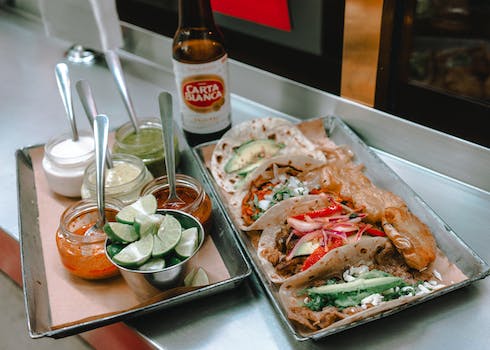

-
Table of Contents
"Embark on a culinary journey through South Africa's vibrant flavors and innovative chefs, as traditional cuisine meets modern creativity."
Introduction
South African cuisine has undergone a remarkable transformation in recent years, thanks to the creativity and innovation of contemporary chefs. This culinary evolution has brought about a fresh and exciting array of flavors, blending traditional South African ingredients with international influences. In this article, we will explore the transformation of South African cuisine, highlighting the contributions of these talented chefs and the emergence of new tastes that have captivated both locals and visitors alike.
The Rise of Fusion Cuisine in South Africa
The culinary landscape of South Africa has undergone a remarkable transformation in recent years, with a new wave of chefs pushing the boundaries of traditional cuisine and embracing a fusion of flavors from around the world. This rise of fusion cuisine has not only brought fresh tastes to the table but has also become a reflection of the country's diverse cultural heritage.
South Africa's history is marked by a rich tapestry of cultures, including indigenous African, Dutch, British, Indian, and Malay influences. Each of these cultures has left its mark on the country's cuisine, resulting in a unique blend of flavors and ingredients. However, it is the contemporary chefs who have taken this culinary heritage to new heights by incorporating international techniques and ingredients into their dishes.
One of the driving forces behind the rise of fusion cuisine in South Africa is the country's growing reputation as a culinary destination. With an abundance of fresh produce, a diverse range of ingredients, and a vibrant food scene, South Africa has become a magnet for food enthusiasts from around the world. This influx of international influences has inspired local chefs to experiment with new flavors and techniques, resulting in a fusion of traditional and modern cuisine.
One example of this fusion can be seen in the use of indigenous African ingredients in contemporary dishes. Chefs are now incorporating ingredients such as morogo (wild spinach), amadumbe (a type of yam), and marula fruit into their menus, giving traditional dishes a modern twist. These ingredients not only add unique flavors but also showcase the rich biodiversity of South Africa's natural resources.
Another aspect of fusion cuisine in South Africa is the blending of traditional cooking techniques with international flavors. For example, chefs are combining classic French cooking methods with African spices and ingredients to create dishes that are both familiar and innovative. This blending of techniques not only adds depth and complexity to the flavors but also pays homage to the country's culinary heritage.
The rise of fusion cuisine in South Africa has also been fueled by a growing interest in sustainable and ethical dining. Chefs are increasingly sourcing their ingredients locally, supporting small-scale farmers and producers, and championing the use of organic and seasonal produce. This focus on sustainability not only ensures the freshness and quality of the ingredients but also promotes a more conscious approach to food consumption.
Furthermore, the rise of fusion cuisine has also been driven by the desire to challenge traditional notions of South African cuisine. For many years, South African food was often associated with braais (barbecues) and boerewors (sausages). However, contemporary chefs are now showcasing a more diverse range of flavors and dishes, challenging stereotypes and redefining what it means to be South African.
In conclusion, the rise of fusion cuisine in South Africa has brought a fresh and exciting twist to the country's culinary scene. By blending traditional flavors and techniques with international influences, contemporary chefs are not only creating innovative and delicious dishes but also celebrating the country's diverse cultural heritage. This fusion of flavors is a testament to the creativity and talent of South African chefs and is sure to continue shaping the country's culinary landscape for years to come.
Rediscovering Indigenous Ingredients in South African Cooking

South African cuisine has undergone a remarkable transformation in recent years, with contemporary chefs leading the way in rediscovering and incorporating indigenous ingredients into their cooking. This shift has not only brought fresh tastes to the table but has also helped to preserve and celebrate the rich culinary heritage of the country.
For many years, South African cuisine was heavily influenced by European and Asian flavors, with traditional indigenous ingredients often overlooked or forgotten. However, a new generation of chefs has emerged, eager to explore and showcase the unique flavors and ingredients that South Africa has to offer.
One of the key aspects of this culinary transformation is the rediscovery of indigenous ingredients. Chefs are now turning to traditional African plants, herbs, and spices that have been used for centuries by indigenous communities. These ingredients not only add depth and complexity to dishes but also provide a connection to the land and its people.
One such ingredient is the marula fruit, which has been used by the indigenous people of South Africa for centuries. This fruit, with its tart and citrusy flavor, is now being incorporated into a variety of dishes, from sauces and marinades to desserts and cocktails. Its unique taste adds a refreshing twist to familiar dishes and introduces diners to a whole new world of flavors.
Another ingredient that is gaining popularity is the rooibos plant. This indigenous plant, which is native to the Western Cape region of South Africa, is known for its antioxidant properties and distinct flavor. Chefs are now using rooibos in everything from marinades and dressings to desserts and cocktails. Its earthy and slightly sweet taste adds a unique dimension to dishes and is a testament to the versatility of indigenous ingredients.
In addition to rediscovering indigenous ingredients, contemporary chefs are also reimagining traditional South African dishes. They are taking classic recipes and giving them a modern twist, using fresh and locally sourced ingredients. This not only elevates the flavors but also showcases the diversity of South African cuisine.
For example, the popular dish of bobotie, a spiced minced meat dish topped with an egg-based custard, is being reinvented with the addition of new ingredients such as chutneys made from indigenous fruits and vegetables. This adds a burst of flavor and freshness to the dish, while still maintaining its traditional roots.
Furthermore, contemporary chefs are also incorporating sustainable and ethical practices into their cooking. They are sourcing ingredients from local farmers and producers, supporting small-scale agriculture, and promoting the use of organic and seasonal produce. This not only ensures the freshness and quality of the ingredients but also helps to support local communities and preserve the environment.
The transformation of South African cuisine is an exciting journey of rediscovery and innovation. Contemporary chefs are not only bringing fresh tastes to the table but also celebrating the rich culinary heritage of the country. By incorporating indigenous ingredients, reimagining traditional dishes, and embracing sustainable practices, they are creating a vibrant and diverse culinary landscape that reflects the true essence of South Africa. So, the next time you sit down to enjoy a meal, take a moment to savor the flavors and appreciate the journey that has brought them to your plate.
The Influence of Global Food Trends on South African Cuisine
The culinary landscape of South Africa has undergone a remarkable transformation in recent years, with contemporary chefs embracing global food trends and infusing them with local flavors and ingredients. This fusion of international influences and traditional South African cuisine has resulted in a vibrant and diverse culinary scene that is attracting attention from food enthusiasts around the world.
One of the key factors driving this transformation is the increasing globalization of food culture. As people become more connected through travel and the internet, they are exposed to a wide range of culinary traditions and flavors from different parts of the world. This exposure has sparked a curiosity and desire among South African chefs to experiment with new ingredients and techniques, and to incorporate them into their own unique interpretations of local dishes.
One example of this is the growing popularity of fusion cuisine in South Africa. Chefs are combining elements of different culinary traditions to create innovative and exciting dishes that reflect the multicultural nature of the country. For instance, traditional South African dishes like bobotie, a spiced meat dish, are being reinvented with the addition of Asian spices and flavors, resulting in a delightful fusion of tastes and textures.
Another global food trend that has made its mark on South African cuisine is the focus on fresh, locally sourced ingredients. Chefs are increasingly turning to local farmers and producers to obtain the freshest and highest quality ingredients for their dishes. This not only supports local businesses and reduces the carbon footprint associated with importing ingredients, but it also ensures that the flavors and textures of the dishes are at their best.
In addition to sourcing local ingredients, chefs are also incorporating indigenous South African ingredients into their dishes. This not only adds a unique twist to traditional recipes but also helps to preserve and promote the rich culinary heritage of the country. Ingredients like rooibos tea, buchu, and marula fruit are finding their way into dishes, adding a distinct South African flavor profile that sets them apart from their international counterparts.
The influence of global food trends on South African cuisine is not limited to the restaurant scene. It is also evident in the growing popularity of food festivals and markets that celebrate the diversity of flavors and ingredients found in the country. These events provide a platform for chefs, food producers, and food enthusiasts to come together and share their passion for food. They also serve as a showcase for the creativity and innovation that is driving the transformation of South African cuisine.
In conclusion, the transformation of South African cuisine is a testament to the creativity and passion of contemporary chefs who are embracing global food trends and infusing them with local flavors and ingredients. The fusion of international influences and traditional South African cuisine has resulted in a vibrant and diverse culinary scene that is attracting attention from food enthusiasts around the world. By sourcing local ingredients and incorporating indigenous flavors, chefs are not only creating delicious dishes but also preserving and promoting the rich culinary heritage of the country. The growing popularity of food festivals and markets further highlights the impact of global food trends on South African cuisine. As the culinary landscape continues to evolve, it is an exciting time to explore the fresh tastes and innovative dishes that are emerging from this dynamic and ever-changing food scene.
Q&A
1. How has South African cuisine transformed in recent years?
South African cuisine has transformed by incorporating contemporary cooking techniques, international influences, and a focus on fresh, locally sourced ingredients.
2. Who are the key players in the transformation of South African cuisine?
Contemporary chefs in South Africa, such as Luke Dale-Roberts and Margot Janse, have played a significant role in transforming South African cuisine.
3. What are some notable characteristics of the transformed South African cuisine?
The transformed South African cuisine is characterized by a fusion of flavors, innovative dishes that blend traditional and modern elements, and a celebration of the country's diverse culinary heritage.
Conclusion
In conclusion, the transformation of South African cuisine has been driven by contemporary chefs who are embracing fresh tastes and innovative cooking techniques. These chefs are reimagining traditional dishes and incorporating global influences to create a vibrant and diverse culinary landscape. Through their creativity and passion, they are not only elevating South African cuisine but also showcasing the country's rich cultural heritage to the world. The exploration of new flavors and ingredients has opened up exciting possibilities for the future of South African cuisine, making it an exciting and dynamic culinary destination.












